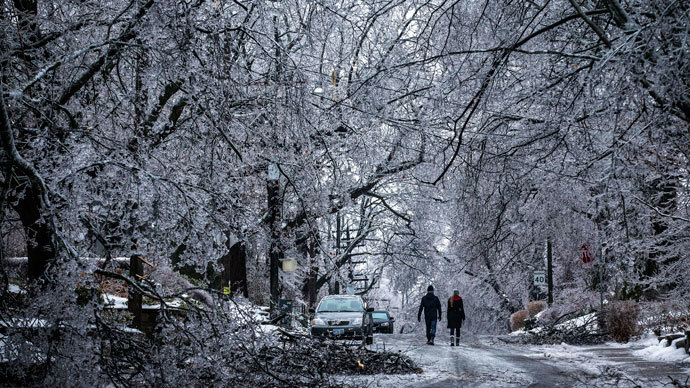Canadians experience jolting 'frost quakes' as temperatures plunge

As temperatures around Toronto and across Ontario drop to -20 Celsius (-4 Fahrenheit), residents are reporting frost quakes that are powerful enough to shake houses and rattle nerves.
Usually found in extreme polar regions, the recent outbreak of
frost quakes, known to meteorologists as cryoseisms, are now
affecting many residents of Toronto, Canada’s most populous city.
The weather-related phenomenon, which can feel like an
earthquake, happens when water and moisture deep underground
freeze as the temperature drops.
Frost quakes typically occur between midnight and dawn, the
coldest part of the night, thus many residents are being jolted
awake by the booming sounds.
Did you hear the loud noises and shaking and rattling last night? They are called #FrostQuakes I felt the banging in my house!
— Tony Monaco (@TonyMonaco) January 3, 2014
“I experienced a small earthquake in California many years
ago, and the sensation was very similar,” Melissa Young, a
US citizen visiting friends in Thornhill, a suburb of Toronto,
told RT. “I was surprised to hear it was a frost quake,
something I’ve never heard of before.”
“Nature is so awesome,” she added.

The effects of a cryoseism, as opposed to an earthquake, “are very localized,” according to the Maine Geological Survey. Thus, residents just a few hundred yards away from the impact zone may not experience anything out of the ordinary.
“The reason that the vibrations do not travel very far is that cryoseisms don't release much energy compared with a true earthquake caused by dislocation of rock within the earth,” the Maine Geological Survey says. “On the other hand, since cryoseisms occur at the ground surface they can cause significant effects right at the site, enough to jar people awake.”
In the majority of cases, frost quakes occur after heavy rain or snow when a large amount of water seeps into the ground. Toronto was hit by freezing rain followed by warmer temperatures, before the recent cold snap.
Hear any loud bangs last night in Toronto? Temp drops → soil moisture freezes → ice expands → ground cracks → BOOM! #frostquake#cryoseism
— Jay Scotland (@JayScotland) January 3, 2014
“They are incredibly rare,” the Toronto Star reported Environment Canada meteorologist Geoff Coulson as saying. This week was his first experience of them in 30 years, he said.
Social media sites over the weekend were mostly devoted to the midnight rattling, as residents attempted to make sense of what was happening.












